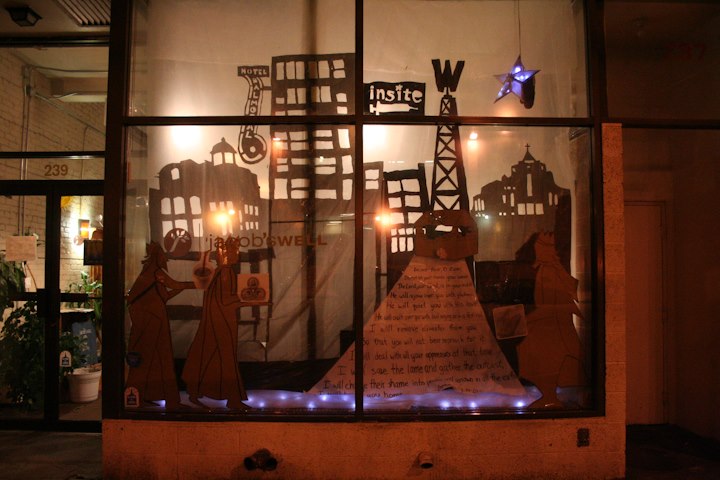by Andrew Stephens-Rennie
Advent was a time for watching and waiting. But who of us was waiting for the right thing? Who of us waiting for Christmas? Who of us was waiting for the Christ?

A journey, a breathless, endless journey. Baby growing within, the long trip to Bethlehem. Tired and slow. Lung capacity decreasing. Ankles swollen. Got. To. Slow. Down.
Waiting for the Christ isn’t the serene kind. And this advent, we’ve felt it. Our collective breath has been taken away. Not in hopeful anticipation. Not in eager joy.
Breath escapes our parted lips as we stare at the screen saying oh-my-god-this-can’t-be-happening.
Waiting isn’t always the serene kind. Sometimes it hurts like hell. Even still, the prophet Isaiah proclaims:
For Zion’s sake I will not keep silent,
and for Jerusalem’s sake I will not rest
until her vindication shines out like the dawn,
and her salvation like a burning torch. (Isaiah 62:1)
I never get it quite right. I’m never ready for Christ’s appearance.
Christmas, I can do. Christ, I can barely deal with.
And I’ve heard those songs, those ancient songs. Centuries old, sung throughout the world. Yet this year, one song rang truer than the others.
Ehstehn yayau deh tsaun we yisus ahattonnia
O na wateh wado:kwi nonnwa ‘ndasqua entai
ehnau sherskwa trivota nonnwa ‘ndi yaun rashata
Iesus Ahattonnia, Ahattonnia, Iesus Ahattonnia.‘Twas in the moon of winter-time when all the birds had fled,
That mighty Gitchi Manitou sent angel choirs instead;
Before their light the stars grew dim, and wandering hunters heard the hymn:
Jesus your King is born, Jesus is born, In excelsis gloria.
A carol from this country, in a language not my own; a song that leaves this settler unsettled. The gospel message sung, proclaimed loud and clear to one and all. The fulfilment of ancient prophecy, as freedom is proclaimed to a people downtrodden, marginalised and maligned by their imperial, colonial oppressors.
Once in Royal David’s City. Once on Victoria Island. An act of sedition. A cry in the wilderness. A prophetic cry for peace resounds. These are cries we must hear. As settlers of this land, and as followers of the Christ, we inhabit two competing stories.
We inhabit the story of a Messiah born homeless and in poverty. The story of a child of refugees. The story of a child and a family fleeing an oppressive government that would have him killed.
Yet we also inhabit the triumphant story of a people who “discovered” this land, who chose to subdue the people they met there, whose policy towards its native inhabitants has been one of colonisation, assimilation, and dare I suggest, genocide.
Two competing stories. Two competing narratives. Both are mine. Both are yours. Which will we choose to live?
Lest we stand idle by, leaving this situation up to the politicians, Gustavo Gutierrez reminds us:
The social influence of the church is a fact. Not to exercise this influence in favor of the oppressed….is really to exercise it against them.
We Christians need to seek reconciliation. So much of what has been done towards First Nations, Metis and Inuit people in the name of the church has been destructive.
And we can point fingers, and we do:
The Catholics!
The Anglicans!
The Presbyterians!
The United Church!
It was them. Us freewheeling Pentecostals and Baptists Free Methodists (and on and on) have nothing to do with these things. And yet, even if somehow we can deny culpability based on denominational association, there is more to be done. The social influence of the church is a fact. Will we exercise that influence in favor of the oppressed, yes or no?
For the sake of Zion. For the sake of the Creator of all. For the sake of God’s holy name, will we keep silent? For the sake of the oppressed peoples in this land, will we rest?
We have been silent so long, yet what will we do, knowing that many of God’s people still bear the scars of residential school? What will we do, knowing that many of God’s people are systematically discriminated against in our hospitals, by our police, and our social welfare system? What will we do, and how will we respond to the prophets in our midst? The voices screaming out in the wilderness, and in spitting distance of parliament hill?
How will we respond?

